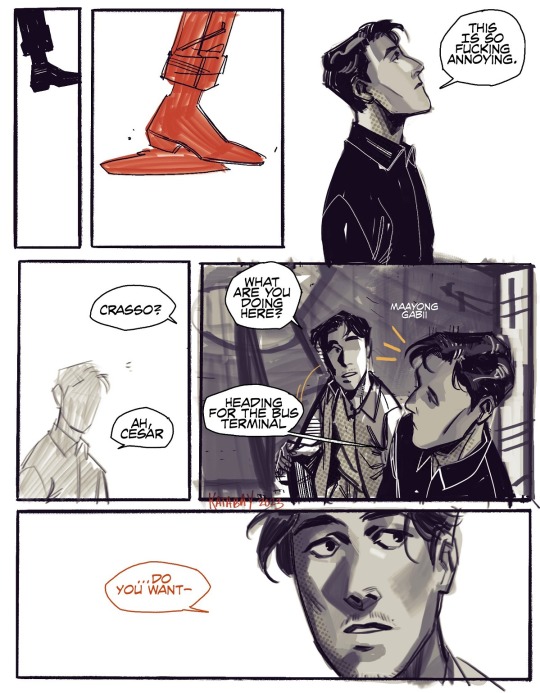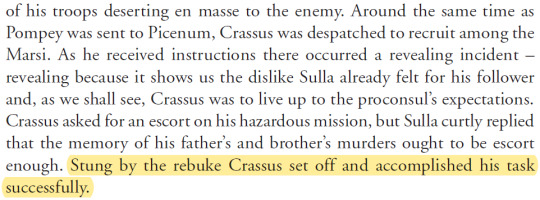#A Political Career
Text
Colin Studwell - A Healthcare CEO
issuu
Colin Studwell, a 27-year-old healthcare CEO, is at the helm of a thriving behavioral health company. With 500 employees and 20,000 patients, his leadership is driving impressive growth. Colin's aspirations include a political future, with plans to serve in the state House of Representatives and beyond.
2 notes
·
View notes
Text

I have never seen this man in my life.
[First] Prev <–-> Next
#poorly drawn mdzs#mdzs#jin guangyao#jin guangshan#xue yang#nie mingjue#Surprise guest appearance from Xue Yang! It feels so nostalgic to draw him.#I love how chipper he is here. Genuinely being such a bro to JGY and celebrating his achievement.#After all his trials and tribulations - Our Little Yao Yao has acquired the recognition he wanted.#I sure hope no further twists happen with his political career and/or marriage!#NMJ *does* strike me as a 'babe' guy. I don't know what it is about him.#He has one term of endearment. Unlike LXC who has a terrifying arsenal. You'll never hear the same one twice.#Xue yang's terms of endearment are 'murdering that guy for you'. And slapping your ass affectionately and platonically.#God damn it I miss Xue Yang. This wasn't supposed to happen
821 notes
·
View notes
Text
anxiety, depression and/or being mentally and/or physically exhausted should always be a valid reason for any employee to take a day off without their paycheck being affected in any way, and also for any student to take a day off without their grade being affected in any way by the way
#important#mental health#mental health awareness#mental health support#important psa#psa#politics#healthcare#medical care#student#studyblr#career#business#capitalism#studying#study#career growth#career goals#political#news#tumblr
396 notes
·
View notes
Text
so weird reading about polar explorers who returned from their expeditions and had a long life and successful career afterwards… don’t you know you were supposed to die tragically?
#looking at you fridtjof nansen. you’re meant to keep returning to the arctic until you die there not have a successful political career!#henry hudson + the franklin expedition + robert falcon scott’s expedition are the blueprint#the terror#<- the terror has conditioned me… the arctic must always win
295 notes
·
View notes
Text
With the whole Trump and Musk fiascos going on it makes me wonder just how many highly powerful institutions in history were in fact run by man-children. It’s gotta be a lot more than we realize. I think historically it was just easier for this kind of thing to go unnoticed because for most of human history these people could not live-tweet their every stupid action to the masses
#how many peoples entire careers have just been coddling an idiot in charge#and filtering them in ways to not make them look like idiots to the masses#this had to happen constantly with royal families yeah?#15 year old bratty new boyking sits the throne because pop just died of tuberculosis#country run by a kid whose modern equivalent would be smoking weed all day and trying to make it#as a Minecraft streamer#how many CEOs and modern political leaders are just following in the footsteps of#’nepotism got an idiot here’
1K notes
·
View notes
Text

“As soon as the lie I wrote and recorded for the audiobook was brought to my attention, I lied more about it.”
Pathological liar continues to lie.
The psychopathy of the GOP is staggering.
#kristi noem#american psycho#gop#dog killer#lies and the lying liars who tell them#donald trump#fuck republicans#fuck trump#mentally fucked#fuck the gop#vote them out#animal abuse#kim jung un#your career is over#south dakota#politics#political asylum#president biden#biden harris 2024#democrats#face the nation
66 notes
·
View notes
Text
if rishi sunak becomes the next british prime minister and anyone celebrates this just because he's the first moc and poc to be prime minister just know that is the equivalent of calling margaret thatcher a girlboss
#this man supported boris johnson until like 4 days ago when he realised the ship was sinking and bailed to save his own career#like forget the discourse surrounding kamala harris this is straight up NOT win for poc#we have multiple tory poc and they are all bad#uk politics#rishi sunak#world tag#ellie rambles
3K notes
·
View notes
Text

Alastor isn't a daddy, he's a 'father'
u get what I mean
#he gives off the vibes of a decent man in 1930s with a decent career and a decent household that proposes to decent lady#and then has decent children#and is very polite to the children#and the children are very polite with him#I can't explain better#papa#alastor hazbin hotel#hazbin alastor#hazbin hotel alastor#alastor the radio demon#alastor#radio demon#hazbin#hazbin hotel#hazbin lucifer#lucifer hazbin hotel#hazbin hotel lucifer#the radio demon
83 notes
·
View notes
Text



testing out some brushes I think I want to use for when I actually start posting bad governance in narrative order, which took a slight detour because I had to do some math with character ages and events and oh I hate doing math so much
so! do you ever realize you're definitely going to get dumped but you're stuck waiting it out because you're not really in a position to do anything about it except sit there and deal with it
ofc you can always just. ditch the party.
this is playing off of the historical dynamic between sulla, pompey, and crassus because sulla sure loved playing favorites, and it was never crassus. however a man doesn't need to be a favorite to make use of him, etc etc and favoritism doesn't last forever, but I'll get into that later



Sulla: The Last Republican, Arthur Keaveney


Rome, Blood & Power, Gareth C Sampson

Plutarch, Pompey
#bad governance the series#republikang romano remixed#komiks tag#i am so. sleepy. right now#anyway i was blocking out the years and i realized that i needed to actually pay attention to who was what age#especially with cesar#but also with crasso's career trajectory#since he was originally planning on becoming a lawyer but SOMEONE ruined that for him so he became a teacher instead#and then decided pivot over to businessman for a bit (in sugar ofc) before going back to politics#THEE ideal crassus-pompey song is hatef--k by the bravery btw
156 notes
·
View notes
Text
A hot take here: but can we all agree that it's not an artist or actor or athlete or any other celebrities' responsibility to be a political activist on every single goddamn issue?? Like for fuck sakes guys give it a rest...I'm sick of it
#taylor swift#taylorswift#or any other celebrity for that matter#its not in their job description to be a political activist on top of their profession whatever it may be#so enough of the “why doesnt he/she/they talk about [insert issue here]?” especially if they choose to speak up on one or two things#its getting quite annoying#especially in regards to Taylor#man the woman cant do any god damn thing right in y'all's eyes#the woman is not perfect like jesus christ let her be#if she want to speak up on Gaza or any other issue thats her choice#she donated to Gaza we obviously know from that alone she's pro human rights#like I understand shes the biggest celebrity at the peak of her career#but still its not her responsibilty to be speak up on political issues thats what you have politicians for#call your MP or congressman or state senator or whoever is in the political realm if you care that much to make a change#the fact that she speaks up at all on any issue whether its feminism or LGBTQ or any issues regarding the music industry is good enough#i dont expect her to speak up on every god damn thing her job is singing and writing and performing not the POTUS
23 notes
·
View notes
Text
gamers who still, to this day, get angry about the simple existence of black ppl (both real players/creators and characters in the games) in the gaming space are genuinely so fuckin awful and unbelievably annoying. it's 2024, either learn to change or die idk
#the twitter for you page is a curse I'll tell u that#im interested in pursuing some sort of gaming career but the fact that my existence as a black person could cause so much unneed discourse#it's fuckin tiring dude. im sick of these dumbass annoying ppl permentally stuck in the past#black people simply Existing in your precious lil video games isn't automatically 'political'#and even if it was 'political' why does that bother you? you exist in the world. ur gonna experience politics one way or another#this post is just me ranting about gamers lmao
33 notes
·
View notes
Text
Leftists and activists I follow have said to be careful because the government can see how it's losing the propaganda war.
And that the only way to beat a propaganda war is to stop using fake propaganda. But who's dumb enough to actually threaten the USA so they have something real to threaten us with? The answer is unsurprising.
The USA.
So I've been hearing that our government would probably plan an attack on its own soil. If it meant putting the American people back in their place and restoring the security of billionaire bank accounts? Absolutely.
Y'all gotta be fucking kidding me.
And it looks like they have targets.
And before you say "the government wouldn't do that"
#look up 9/11#the geo-political conditions for the US president were damn near identical to what they are now#i imagine career politicians would see that and see an easy way to restore patriotism since thats what happened last time
77 notes
·
View notes
Text
im not going to lie to u i hate change and have always been incapable of having goals on where to live within my own state much less a completely different one but 26 years of this horrible weather that only gets worse has me semi considering moving out of texas. Somewhat.
#i hate change so much that the politics aren't enough to make me leave the only place ive ever known. but the heat might be.#sucks bc ive been wanting to be more active and go to the park and such! but its still 95° at 2 am.#talkys#anyway i still dk where id live or how id live there also every state has its own weird different Bugs and I like buying#an entire garbage bag of pan dulce for $6 so i guess ill just stay here#idk how id survive without knowing anyone in the whole state...or without being able to go to mexico for medical emergencies...#but i cant take it anymoreeee#idk how im going to do anything this whole summer when my room is an oven#i need to like find a career that wld have me move out somewhere ykwim#like...tell me where to go and have a job ready for me there...
28 notes
·
View notes
Text
Because @maltheniel has enabled me, I'm going to tell you about William Henry Seward.
If you had the American history education that I had, you might have heard of a thing called Seward's Folly--also known as Alaska. Seward was the Secretary of State who was mocked for buying America territory in what appeared to be a barren wasteland, until he was vindicated by the discovery of oil and gold and a jillion other useful natural resources. If you had the education that I had, this is the only thing you heard about him, but the more I look into the Civil War, the more baffling this is, because this guy is everywhere in the political scene of the time.
Seward was an extremely vocal anti-slavery Whig from New York. He started as a US Senator in 1849, and he became part of President Zachary Taylor's inner circle, influencing him to support measures to keep slavery out of the new territories. After Taylor died, the question of slavery in the territories dominated politics for the next decade, with the conflict getting more heated and the positions getting more polarized. The Whig Party fell apart because of disagreements over the issue; Seward held on for as long as he could, but eventually joined the newly-forming Republican Party, and became well-known for his eloquent speeches against slavery.
When it came time to choose the Republican nominee for the 1860 presidential election, Seward was by far the top candidate. All but a shoe-in. Unfortunately, some of his anti-slavery speeches were a bit too eloquent, and gave him a reputation for being much more radically anti-slavery than he was. A significant portion of the party doubted he could win a nationwide election when slavery was such a divisive issue. This gave Lincoln's team a chance to pitch him as a less-radical option, which allowed him to come from behind and win the nomination.
Seward was extremely gracious about the loss, immediately publishing letters announcing his full support of Lincoln as candidate, and putting his own campaign manager to work getting Lincoln elected. Privately, though, he was seething. He had been in politics for decades, helped to build the party, and then lost his chance at the presidency to a guy who'd been working as a backwoods lawyer for the last twelve years.
But he knew his politics, and knew it was better to support the party's candidate than to oppose him. Lincoln offered Seward the prime Cabinet position of Secretary of State--he was qualified for it and deserved it--and Seward accepted. Seward hoped that he'd be able to help select the other Cabinet members, so he could pick people from his own faction who he'd work well with. Then he, with his extensive connections and political experience, could be the real head of the administration, with Lincoln as a compliant figurehead.
Lincoln was having none of it. He listened to Seward's suggestions, but he'd basically already chosen the people he wanted for his Cabinet, across all factions of the party. While he made use of Seward's expertise and trusted him as Secretary of State, he was going to be head of his own administration and be the one making all the final decisions. After a rocky start, Seward came to recognize that Lincoln had a shrewd mind and good judgement, and he became Lincoln's loyal supporter and a good friend.
But there was a persistent idea that Seward was the real power behind the throne, sparked partly by the prominent role he took in Washington between the election and the inauguration. States started seceding almost as soon aa Lincoln was elected, and Seward was the one who had to hold things together in Washington while Lincoln was tying things up in Illinois. He was getting reports from informants, watching out for Southern spies, and keeping Lincoln abreast of what was going on. He gave a stirring speech to Congress urging the Southern states to keep the Union together, offering all sorts of concessions to mollify them, such as amendments preventing the federal government from interfering with slavery. It was a highly controversial speech, and his wife, Frances, raked him over the coals for it. She understood, earlier than almost anybody, that this crisis would turn into a long war about slavery, and that they couldn't afford to bend on that issue, even to keep the Union together. (Lincoln privately approved of several measures Seward talked about, but publicly said little, preferring to see the public's response to Seward before taking official positions.)
Seward was a little bit like a Civil War version of Evil Chancellor Traytor. Under both Lincoln and Johnson, rumors persisted that Seward was the shadowy figure who was really in charge, secretly manipulating the president into making unpopular decisions, even though most of the time, Seward had nothing to do those decisions, and often disagreed at least partially with what the president chose to do.
Best example of the effects of this misconception is the time Seward came under attack during the middle of the war. The war was going badly, and since people couldn't directly attack the president, they started going after Seward. Chase, the Treasury Secretary, told some members of Congress that Seward was the reason the Cabinet couldn't get along, and that he was always trying to take control. These senators wanted to meet with the president and force him to get rid of Seward. When Seward heard about this, he gave Lincoln his letter of resignation, not wanting to cause problems for the administration. Lincoln responded by allowing the senators to join in a Sewardless Cabinet meeting. When confronted with both the senators and the Cabinet, Chase was forced to admit that his stories had been exaggerated, and the other Cabinet members rallied to Seward's defense, resenting Congress' meddling. Lincoln refused to accept Seward's resignation, and Seward returned to the Cabinet, having been saved by Lincoln's political acumen.
I'm going to skip ahead so I can tell you the craziest part of the story. Four days before the Civil War officially ended, Seward got into a carriage accident that left him bedridden with a broken jaw and a bunch of other injuries. When told of Lee's surrender on April 9th, Seward said (through a broken jaw, after barely surviving a painful accident), "For the first time in my life, you've made me cry." (Which is both touching and an incredibly badass claim, given what he's just suffered.)
Five days later, John Wilkes Booth shot the president at Ford's Theater. Everyone knows (or should know) that part of the story. What I didn't know was that his conspiracy also called for Seward's assassination. Booth knew his Shakespeare and didn't want to leave Seward alive as a Marc Antony to eulogize the dead tyrant. (He also wanted to kill Andrew Johnson, but that assassin chickened out, and it's not really important to this story).
While Booth was at the theater, his co-conspirator went to Seward's house under the pretense of delivering medication. When Seward's son wouldn't let him go upstairs, the assassin tried to shoot him and broke his skull with the gun. The assassin then made his way to Seward's bedroom--where, I need you to remember, Seward was still bed-ridden--and stabbed him five times in the face and neck. Like, sliced away flaps of flesh. The only reason Seward didn't die was because the splint for his broken jaw deflected the blade away from his jugular vein. And because his other son and bodyguard made it into the room and forced the assassin to flee.
Chalk this one up in the "Parts of American History I'm Furious No One Told Me About" column.
While Seward was recovering, they hid the president's death from him, thinking he wouldn't survive the shock. But he figured it out three days later when he saw the flags at half-staff through his bedroom window, and realized that if Lincoln were alive, he'd have been the first to come see Seward after the attack.
Of course, Seward survived (badly scarred) and went on to buy Alaska. Which is an interesting story. But not half so interesting as all the stuff that came before it.
#history is awesome#presidential talk#answered asks#maltheniel#i really tried to keep this short#but there's just too much that i find interesting about this guy#like i said he was involved in everything political at the time#and you've got to talk about a lot of it to get across just how involved he was#like i had the whole post written out and then realized i hadn't even talked about the between-administrations thing#i can't leave that out!#so even though no one wants to read that much about william seward i want to tell you that much about him and it's my blog so there#i also have to add that it was very satisfying to head to wikipedia#and find out that his first political party was specifically an anti-mason party#and that he got criticized for his support of catholics#he's a career politician so there's a lot to disapprove of but i very much like both of those things about him
189 notes
·
View notes
Note
Been following you since 2019, I've seen things, but it's INSANE how some things will never change. This reminds me of the time where you wanted to renovate Hallownest, in like, 2021. Keep doing what you do your blog is amazing and still love your art 👍
many things come and go but my single-minded obsession to waltz into any fantasy world, obtain fictional absolute power and place or reform a system of government, and then leave with no trace behind except a well-functioning machine of a State, like a fantasy Sulla, is forever
#anonymous#[.asks]#I've read a lot more political and state theory since then to be fair so I like to think my systems work a bit better now#and THIS is why I am never going try for a career in politics on purpose /j#and also these fictional States are not accurate to my political beliefs. And I dont think any of this logic is applicable in reality.#<- this is a needed disclaimer i think like. This only works in my head and in a fictional space okay. okay
23 notes
·
View notes
Text
pep really tried his hardest to make messi's life both on and off the pitch as easy as possible at barça so he could just play football happily with no worries or stress..

#like he dealt with the board all on his own and wouldn't let them touch him.. scaloni is the same way#he just tried his best to make sure messi enjoyed his time with the nt..#i think there's smth to be said abt how both pep and scaloni were novice coaches at the beginning#but they both understood messi in a way no one else did and saw HIS vision and messi in return brought them glory..#i'll keep saying until i lose my voice but the best coaches in messi's life are pep and scaloni literally no one else compares#you have to very sprecial yourself to really unlock messi's potential otherwise you'll just squander his talents#which unfortunately is what happened to messi for the majority of his career#i think despite all his achievements he's actually underachieved bc of how long he's been mismanaged and had to rely on his#individual brilliance#which is what im afraid will happen to him under xavi. not to mention the political turmoil laliga's experiencing rn#you bet your ass messi's going to get involved somehow#and this was what pep tried protecting messi from during his era hahahaha kms
153 notes
·
View notes